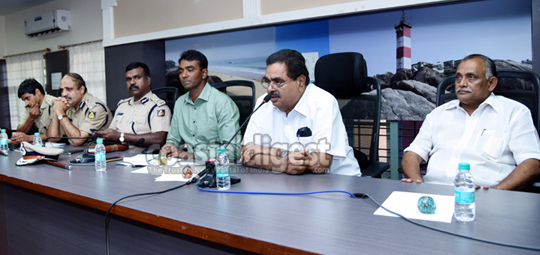Mangaluru, Jul 14: B Ramanath Rai, Dakshina Kannada district in-charge Minister has said that the principal Opposition Bharatiya Janata Party (BJP) boycotting the all-party meeting indicates that it does not want restoration of law and order in the district.

Presiding over the meeting here, Mr. Rai said that the May 26 stabbing of a minority youth by others at Kalladka was a plot to foment communal disturbances in the district.
While the district had witnessed intense communal clashes claiming more life earlier, the present disturbance has been continuous, being created through “guerilla” techniques. Besides the BJP, which had declared its intentions to boycott the meeting earlier, the Janata Dal (Secular) leaders too boycotted the meeting protesting against the administration’s refusal to allow party president H.D. Deve Gowda to hold a peace march in the district.
Responding to suggestions in the meeting, Mr. Rai said that he would lead a “peace march” in the district comprising political and religious leaders after prohibitory orders under Section 144 were lifted. He asked the administration to use its discretion while considering the plea to lift Section 144 in Sullia, Puttur and Belthangady taluks.
“The demand could be to foment trouble in those taluks too,” he said.
The Minister said that he and his Ministerial colleague U.T. Khader have decided not to react to some statements, as otherwise the war of words would not end.
Meanwhile, Mr. Rai said that he would offer a “harike” at Uddabettu Dargah to prove his “innocence” which is disputed by the BJP and Sangh Parivar leaders in the communal unrest.
Participants in the meeting, including a few Christian priests and Left leaders, urged the administration to deal with the trouble-makers with an iron hand. Everyone knows who is creating trouble and such people should be dealt with accordingly.
The police force at the lower level should be reshuffled as a majority of them have remained in the same place for years together, some suggested.
Mr. Khader [Food and Civil Supplies Minister] said that though the murdered Ashraf Kalai and Sharath Madiwala belonged to certain organisations, they did not have any criminal record. The government would pay compensation to their kin, he said.
MLAs K. Abhayachandra Jain, B.A. Mohiuddin Bava, Shakuntala Shetty, Mangaluru Mayor Kavita Sanil, Deputy Commissioner K.G. Jagadeesha and senior police officials were present.
Also Read: Peace meet: Police urged to be ruthless towards hatemongers; BJP boycotts





Comments
we know the PEACE society very well who are killing people in the name of animal(cow)
Add new comment